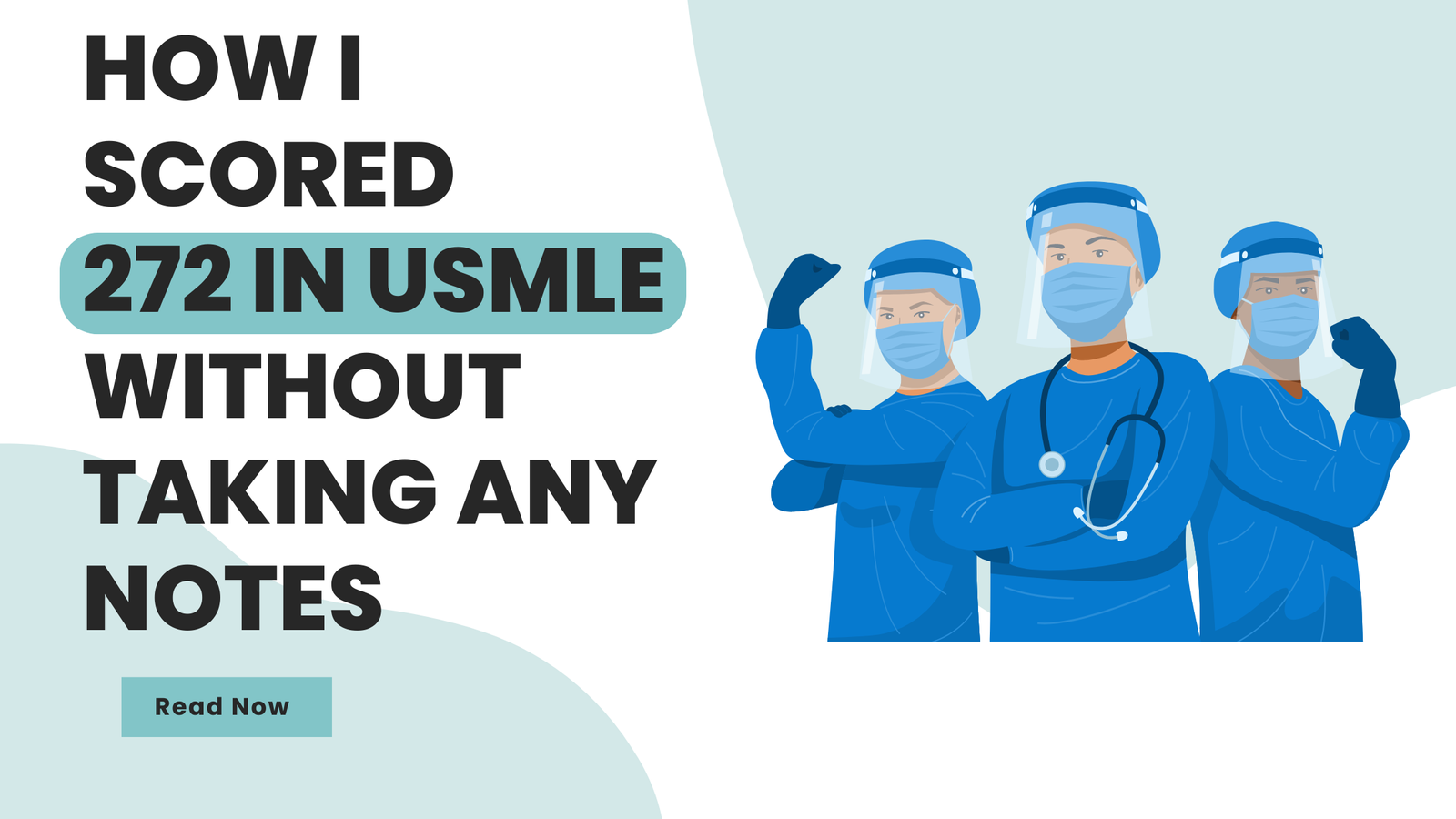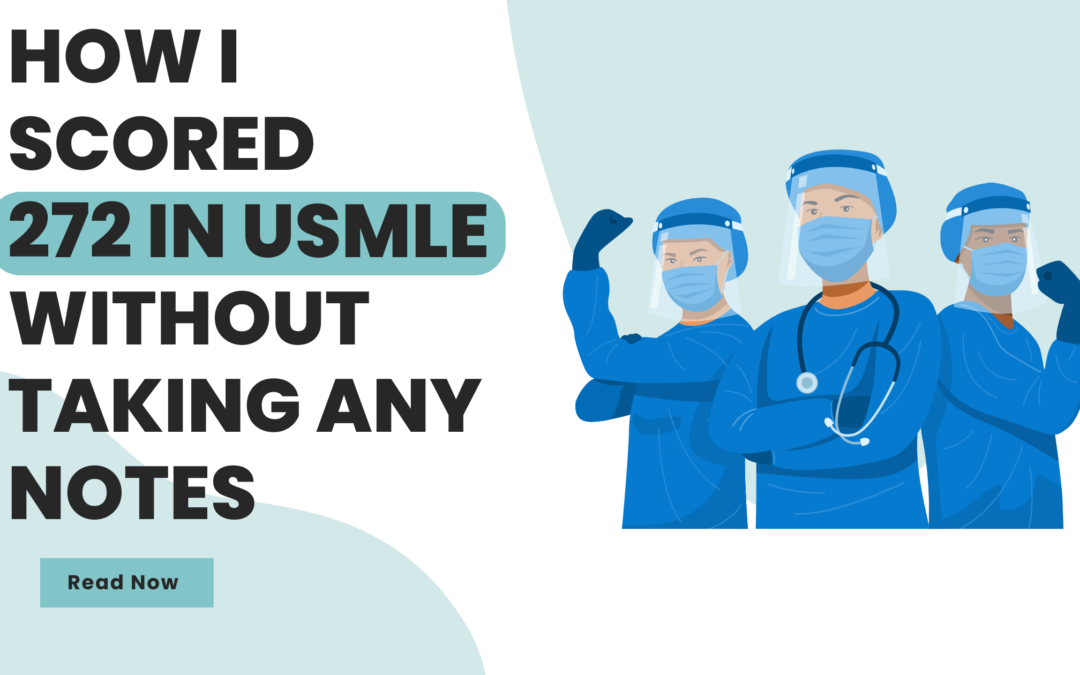
What’s up, guys? Welcome back to a new blog.Today, I’m going to describe you how Santiago scored 272 on the USMLE without taking a single note. So, let’s get started with Santiago’s own experience from his voice!
The Dogma of Med Student Learning
To begin on the right foot, I want to make sure we’re all on the same page. That’s why I’m introducing you to what I like to call the dogma of med student learning. This is basically the series of steps that med students usually take to learn a topic for a test, such as the USMLE.
First, they watch a video or read a book – some sort of input, let’s say. Then, they take notes, trying to summarize the important points. After that, they review those notes to memorize the key takeaways. Finally, they apply all that knowledge by doing some type of test, usually in the form of quizzes.
Now, if you want to understand exactly how I managed to change this dogma, we first need to abstract the underlying processes involved in each of these steps. In the first step, when you’re watching or reading, you’re actually learning – that’s what you’re doing. You’re learning. Then, you’re creating a summarized backup. Next, you’re reviewing that backup to memorize the content. And finally, you apply everything you’ve learned.”
Because while applying, it’s sort of a skill on its own. Now, to eventually change this dogma, I came up with a couple of premises. The first one is that the only utility of taking notes for the USMLE is creating a backup to review later. That’s the only utility, and I think we can all agree on that.
We know that translating information from, let’s say, the First Aid and Beyond videos to our notes is only translating information from one place to another. It doesn’t magically make us understand or even memorize the content, but it creates a summarized version of all those resources. So, we tend to think that it’s worth it because we can just review that summarized version over and over again.
The Issues of Notes
Now, the thing you need to understand is that there are a couple of big cons about that whole backup of your notes type of thing. First, creating your notes – creating notes of everything that Step 1 and Step 2 cover, even if you’re just annotating on your First Aid, takes a lot of time. And the second thing is that when you have those notes, given that you were the one who created those notes, you’ll start re-reading on your review with a sense of ‘I know this, I know this.’ As Mark McDaniel says, that second reading becomes cursory, insidious, and it makes you think you know when, in fact, there are flaws.
But the thing is, and most people tell this to me, like, ‘Okay, I know that taking notes has a lot of issues, but I just don’t find any other way to review the content over and over again until I memorize. Like, what am I supposed to do? Watch all of the videos twice or read all the Kaplan books again and not take notes? It seems equally inefficient.’
The second thing is that when you have those notes, given that you were the one who created those notes, you’ll start re-reading on your review with a sense of ‘I know this, I know this.’ As Mark McDaniel says, that second reading becomes cursory, insidious, and it makes you think you know when, in fact, there are flaws.
The Solution
So, if only we were to find an already-done, summarized backup created for us that we didn’t have to take our time off to create, that helps us summarize the information or review it multiple times to grind it into our memory, that bypasses the whole familiarity problem, we’d be set. Like, that would be it. Well, turns out that summarized backup actually exists, and it was hiding in front of our faces all along in the form of question banks.
You see, all question banks have answers, and if you think about it, those answers are sort of like notes, only delivered in tiny chunks. But if you were to clump all of those notes together, all of those answers together, you’d have something like a book, like a file of notes of everything, really. And the good thing about them is that you don’t have to create them; they’re already done for you. You don’t have to spend a single minute creating those notes, you just have to pay for them. Second, you bypass the familiarity problem because, again, they were not created by you, so you won’t be reading with the sense of ‘I know this, I know this.’ I noticed that, on top of that, given that they were created by a team of persons, you get a lot of different perspectives explaining the same subject. So, if you find it hard to grasp a specific subject, maybe a certain explanation on one of those questions helps you to understand the subject better.
Additionally, on top of everything else, those notes sort of integrate spaced repetition and application altogether because you have to understand that most subjects in the question banks repeat themselves over and over again. So, you’ll get a lot of repetition, and you’ll be reviewing the special notes, you’ll be reading the special answers over and over and over again. If you think about it, question banks are sort of like a mix of super notes, super flashcards, and a question bank all at the same time. They help you review, they help you memorize, and they help you learn how to apply your knowledge all at the same time. So, they’re great.
And the only thing that really scares people when I propose this to them is that they believe, ‘Oh, but the notes – when I create my notes, I have the benefit that I can go over them every time I want.’ Like, if for example, I found an explanation on a question bank and I want to review it further, I want to review it in the future, I don’t have that choice. I’m finding the answer, finding the question, but the specific question is almost an idea.
And I agree that’s probably the most difficult part of using question banks as your notes. But you can always mark questions, and by marking them, you’re able to review them later in the future whenever you need to. Additionally, other question banks, such as Amboss, allow you to create folders at will. So, for example, if you want to create a folder specifically about notes you want to review, all notes explanations you want to review about cardiology, you can do so. You can create that folder, and you can put 2, 3, 10, 20 questions over there, and every time you need to review them over and over again, you just click on the folder, go ahead, and review them as many times as you want.
The Modified “Dogma”
So, basically, what I did is I went from learning, creating, reviewing, applying to learning, don’t creating anything, and then reviewing, applying all at the same time. And for my Step 1, that was it, like it ended there.
But for my Step 2 CK, I wanted to test a second premise because you see, I started seeing, I started realizing that the same question bank in itself gave me tons of information, like it was a learning resource. In fact, I often found that question banks were better at explaining some subjects than where the books and videos and the Amboss library, and so on and so forth.
For instance, when I was reading about transverse myelitis, I found it so general everywhere. Like, for example, if you read UpToDate or you’re at the Amboss library, it just said, like, it can give motor, sense, sensitive, and autonomic symptoms, but exactly how does it present? Like, I wasn’t sure of the specifics; it was so general.
Now, when I found a question on that topic, the way the stem was set up, it made me realize, ‘Ah, so those are the sensitive symptoms they were talking about, those were the motor symptoms they were discussing, that’s how they present autonomic symptoms.’ Like, it makes you realize how exactly all of that information is going to be presented. I’m by you realizing that those details, everything becomes so much clearer.
So, I don’t know, I wanted to test what if I used just question banks as a learning resource? Like, what if everything – learning, reviewing, applying – everything came off straight from the question banks? So, I tested that, I ran the experiment, I said to myself, ‘Okay, for my Step 2 CK, I’m only gonna do questions, like, I’m not gonna review books, videos, nothing, just questions.’ If I found a specific subject that I cannot grasp with just the explanation from the question bank, then I’ll go ahead and review it further in the Amboss library, in UpToDate, or in YouTube, wherever I need to, but mostly it will just be question banks. And well, here you have the result. A couple of disclaimers, though: first, I did make about 500 cards, so take that into account. I spent no more than 30 minutes a day, but I did make some flashcards. And second, I marked about 1600 questions, give or take, between Amboss and UWorld, because again, those were sort of like my notes. That second pass of the marked ones served me as a review of my notes.
My Final “Dogma”
Yeah, that was pretty much how I did it. That’s pretty much how I got the score I got without taking a single note. I just reshaped the whole dogma of med student learning to do everything at the same time from just one resource. I don’t know if it makes sense to you, try it out. But anyway, that was really everything for the video. If you found it useful, make sure to leave a like and comment down below. That really helps me to continue uploading content such as this one completely free of charge for you guys.


“Education is the passport to the future, for tomorrow belongs to those who prepare for it today.” – Malcolm Xr
Related Articles
5 Exciting Facts for Doctors in the UAE You Can’t Miss
Table of Contents Introduction to Working in the UAE as a Doctor So, one thing that is very very important is that the UAE is a tax-free country, like some other Arab countries. There is no tax you have to pay in these countries. So, because of this tax-free status,...
MRCP vs PLAB: 10 Expert Tips for International Medical Career Success
Table of Contents Hi, are you considering a postgraduate medical career in the UK and confused about the MRCP or the PLAB route and wondering which is the best for you? You are not alone in this. The UK medical landscape is rapidly changing with scarcity of Junior...
MRCP vs. PLAB: Which Path Will Make You a Top Doctor in the UK?
HIGHER STUDIESHi, are you considering a postgraduate medical career in the UK and confused about the MRCP or the PLAB route and wondering which is the best for you? You are not alone in this. The UK medical landscape is rapidly changing with scarcity of Junior doctor...


